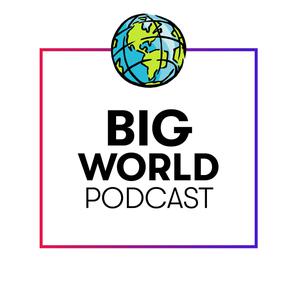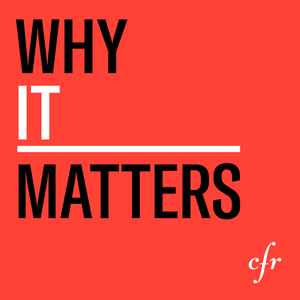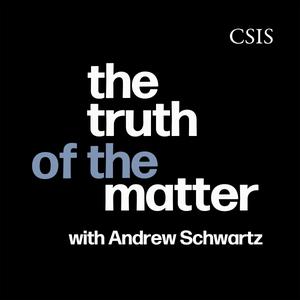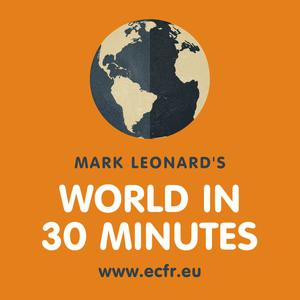
Big World
School of International Service
Big World shines a spotlight on complex ideas and…
- 22 minutes 23 secondsWhat's Ahead for Mexico's Democracy?
In this new episode, School of International Service Distinguished Diplomat in Residence and former US Ambassador to Mexico Earl Anthony Wayne joins Big World to discuss Mexico’s recent election and US-Mexico relations.
Wayne, a professor in the Department of Foreign Policy & Global Security, begins our conversation by explaining why Mexico is important to the United States (1:55). Wayne also provides background on Claudia Sheinbaum, Mexico’s first female president (2:37), and discusses what her presidency may mean for Mexico (4:08).
What is at stake for Mexico’s democracy under Sheinbaum’s administration (7:12)? What legacy is President Andrés Manuel López Obrador, “AMLO,” leaving as he exits office (11:08)? Wayne answers these questions and discusses the impact of a controversial judicial overhaul bill supported by AMLO’s party that was passed in September (12:51). Wayne concludes our conversation by discussing the implications of the upcoming US Presidential election on US-Mexico relations (15:47).
9 October 2024, 12:00 pm - 24 minutes 38 secondsHow to Get a Job in International Affairs
Sara Jones, the director of the SIS Office of Career Development joins Big World to discuss the topic at the forefront of many international affairs students’ minds: how to get a job. Jones oversees career development support for SIS undergraduates, graduate students, and alumni, including events, advising, and employer relations.
Jones begins our conversation by sharing the best kinds of internships for international affairs students (1:35). She also explains how international experiences and foreign language skills can help prepare students for the job search (4:21).
How has the job search process changed in recent years (8:42)? What are some common mistakes that students make on application materials (14:02)? Jones answers these questions and ends our discussion by offering practical advice for students who don’t know where to start their job search (19:22).
In the “Take 5” segment (12:01) of this episode, Jones answers this question: What are the top five job sites for students to utilize in their job searches?
3 September 2024, 12:00 pm - 34 minutes 6 secondsSports Diplomacy and the Olympic Games
Cue the fanfare: in this new episode, School of International Service professor Robert Kelley joins Big World to talk about sports diplomacy and the soft power of the Olympic Games.
Kelley, an expert in new diplomacy studies who researches at the intersection of politics and culture, begins our conversation by defining and explaining the objections of both sports and public diplomacy (1:45). Kelley, an Olympics enthusiast, also discusses this year’s Opening Ceremonies in Paris (3:54) and explains how Olympic athletes serve as diplomats during the Games (6:18).
When have the Olympics served as an important diplomatic bridge (13:16)? When have the Games spotlighted simmering political disputes and conflicts (17:29)? Kelley answers these questions and discusses the history of human rights abuses surrounding the Olympics (25:10), and he considers how the Games have served as a platform for protest in years past (28:54).
In the Take 5 segment (20:32) of this episode, Kelley answers the question: what are five examples of Olympic Games that have been diplomatically successful, and why?
1 August 2024, 12:00 pm - 25 minutes 28 secondsAbortion Access in a Post-Roe World
*Note: This episode was recorded before the US Supreme Court in Food and Drug Administration v. Alliance for Hippocratic Medicine unanimously rejected a lawsuit challenging the FDA's rules for prescribing and dispensing the abortion medication mifepristone on the issue of standing.
American University School of Public Affairs professor, lawyer, and reproductive rights and policy expert Jessica Waters joins Big World to discuss the status of abortion access and bodily autonomy in the US. The discussion takes places two years after the Supreme Court overturned the nearly 50-year precedent established in Roe v. Wade with the Dobbs v. Jackson Women’s Health Organization decision, authored by Justice Samuel Alito.
Waters begins our conversation by discussing global abortion access (1:57) and explaining the impact of “heartbeat bills” that several states have implemented (3:26). She also describes the importance of protecting access to abortion medications such as mifepristone and misoprostol (5:41).
What is fetal personhood and how does it affect other reproductive healthcare like IVF (8:45)? What is the rationale for restricting abortion medications (18:53)? Waters answers these questions and ends our discussion by highlighting the impact that limited abortion access and the need to travel—often long distances—for reproductive care has on women across the country (22:24).
In the “Take 5” segment (14:33) of this episode, Waters answers this question: What are five policies the government can enact to protect reproductive health?
1 July 2024, 12:00 pm - 17 minutes 17 secondsIntercultural Communication in the Global Workforce
SIS online programs professor and intercultural consultant Melissa Hahn joins Big World to discuss the importance of fostering strong interpersonal relationships in the global workforce. Hahn is the author of a recent book titled, Forging Bonds in a Global Workforce: Build Rapport, Camaraderie, and Optimal Performance No Matter the Time Zone.
Hahn, who teaches intercultural communication, begins our conversation by sharing her inspiration for writing this book with her colleague, Brandeis University professor Andy Molinsky (1:47). She also describes, in broad strokes, the approach her book lays out for building more authentic cross-cultural relationships in the workplace (2:37).
Why is it important to build cross-cultural relationships in business settings (6:46)? Does the United States’ approach and framework for diversity, equity, and inclusion (DEI) initiatives translate to a global context (12:00)? Hahn answers these questions and ends our discussion by offering practical advice for anyone wanting to form more authentic intercultural relationships (14:44).
In the “Take 5” segment (9:54) of this episode, Hahn answers this question: What are five tools to help build cross-cultural relationships?
30 May 2024, 12:00 pm - 37 minutes 42 secondsStar Wars, Imperialism, and Post-Conflict Societies
School of International Service professor Patrick Thaddeus Jackson joins Big World to discuss imperialism, post-conflict societies, and the parallels between the Star Wars universe and our own.
Jackson, the chair of the SIS Department of Global Inquiry, begins the discussion by describing how the original movie trilogy depicts the struggles of organizing a resistance movement (5:26). He also discusses how Star Wars shows such as Andor explore the lived experiences of everyday citizens under autocratic rule (7:22) and explains how the show depicts bureaucratic corruption within regimes (9:31).
How do Star Wars shows like Ahsoka and The Mandalorian portray post-conflict societies? (18:09) How do the power struggles we see after the fall of the Empire mirror those in our world? (26:20) Jackson answers these questions and discusses how rebuilding the galaxy has mirrored real-world state-building after the fall of a regime (29:46). To close out the discussion, Jackson discusses how Ahsoka and The Mandalorian explore the impact of imperialism and post-conflict society on individuals and how conflict and trauma shape one’s journey (32:26).
In the “Take 5” segment (21:49) of this episode, Jackson ranks his top five lightsaber combat sequences from the Star Wars shows and movies.
1 May 2024, 12:00 pm - 37 minutes 51 secondsThirty Years after the Rwandan Genocide
School of International Service professor Claudine Kuradusenge-McLeod joins Big World in this episode marking the 30th anniversary of the Rwandan genocide. In 1994, a roughly 100-day massacre by Hutu militias targeting the Tutsi minority ethnic group resulted in the death of about 800,000 people, including Tutsis, moderate Hutus, and Twa.
Kuradusenge-McLeod, who is a scholar-activist specializing in genocide studies, begins our discussion by describing, in broad strokes, the events that led up to the genocide in 1994 and what occurred during the 100 days (1:23). She also discusses the international response to the events of the genocide (5:26) and explains where relations between Hutus and Tutsis in Rwanda stand today (8:49).
What is life like for survivors of the genocide today, both within Rwanda and in the diaspora? (10:57) What has been President Paul Kagame’s impact on Rwanda since the genocide, and do people consider him a dictator? (15:59) Kuradusenge-McLeod answers these questions and analyzes whether or not justice has been served in the punishment of genocide perpetrators (26:43). To close out the discussion, Kuradusenge-McLeod discusses the state of human rights in Rwanda today (31:29) and explains the lasting impact of the genocide on the nation (33:37).
In the “Take 5” segment (22:59) of this episode, Kuradusenge-McLeod answers this question: What are five things Rwanda needs to do to become fully democratic?
1 April 2024, 4:00 pm - 38 minutes 48 secondsDid the Woman, Life, Freedom Protests Change Iran?In this episode, School of International Service professor Shadi Mokhtari joins Big World to discuss the history of protests in Iran, the unprecedented international reaction to Mahsa Amini’s death, and the greater impact of the Woman, Life, Freedom protests. Over a year has passed since Mahsa Amini was detained and died in Iran after being detained by Iran’s morality police for improperly wearing a hijab in September 2022. Her death sparked massive protests around the world and was the catalyst for the Woman, Life, Freedom movement in Iran. Mokhtari begins our conversation by providing a brief background on Iran’s long history of protests (1:51). Mokhtari also describes the 2022 Woman, Life, Freedom protests (8:59) and discusses the key grievances raised by the protesters (16:33). How did the Iranian diaspora respond to these protests (18:04)? Did the protests help to unite Iranians or did it cause further divides (30:22)? Mokhtari answers these questions and more. Mokhtari ends our conversation by discussing how the Woman, Life, Freedom protests will be viewed in Iran in the future (33:38). In the “Take 5” segment (28:14), Mokhtari answers the question: What things would need to change before we see meaningful political change in Iran?1 March 2024, 5:00 pm
- 37 minutes 26 secondsLabor Strikes BackOrganized labor is having a moment. In this episode, School of International Service professor Stephen Silvia joins Big World to discuss the evolution of the labor movement, the significance of the recent United Auto Workers strike and recent organizing attempts by both Starbucks and Amazon employees, and what the future holds for unions. Silvia, who researches comparative labor employment relations with a focus on the US and Germany, begins our conversation by discussing how union organizing has changed over the past few decades (1:50). Silvia also analyzes the importance of the recent UAW strike and resulting contracts with the Big Three automakers (3:47) and discusses efforts by the UAW to organize foreign-owned auto plants in the American South, as detailed in his recent book, The UAW’s Southern Gamble: Organizing Workers at Foreign Owned Vehicle Plants (8:22). What challenges will the UAW face surrounding electric vehicle manufacturing (19:27)? How will organizers confront declining union membership (25:02)? Silvia answers these questions and discusses how the “union avoidance playbook” can make organizing difficult at places like Amazon and Starbucks (26:53). Silvia ends our conversation by explaining why Gen Z is making unions cool again (28:42). In the “Take 5” segment (15:04), Silvia answers the question: What steps or practices are necessary for workers to have more of a voice in the workplace?1 February 2024, 5:00 pm
- 30 minutes 34 secondsHow Do We End "Lies about Black People"?Can you think of a stereotype or lie you’ve heard about Black people? Do you know how or when that stereotype came to be? In this episode, SIS professor Omekongo Dibinga joins Big World to discuss his new book, Lies About Black People: How to Combat Racist Stereotypes and Why it Matters, and explain how we can improve on our antiracist journeys. Dibinga begins our conversation by explaining the original idea and his research and writing process for the book (2:14), then moves to discussing how lies and stereotypes gain power in people's minds (4:28). Dibinga also explains why he doesn’t use the term “BIPOC” (7:55) and why reexamining our vocabulary is so important (9:44). Where did the ‘Black people can’t swim’ stereotype come from (12:19)? How have whitewashed, revisionist versions of history detracted from our knowledge of our authentic history and experiences as Americans (20:02)? Dibinga answers these questions and more. To close out the discussion, Dibinga shares why celebrating and acknowledging Black history and achievements is so important (28:45). In the “Take 5” segment (17:55) of this episode, Dibinga answers this question: What are five ways that people can identify preconceived notions and work to improve on their anti-racist journey?2 January 2024, 5:00 pm
- 32 minutes 40 secondsWill Climate Shock Cause Climate Change Action?Does throwing tomato soup at a famous painting force the world to respond to climate change? In this episode, Dana Fisher, School of International Service professor and director of American University’s Center for Environment, Community & Equity, joins Big World to discuss the evolution of climate activism, the demographic of people participating in climate protests, and the goal of more radical climate action. Fisher, whose research interests include climate activism, environmental stewardship, and climate politics, begins our conversation by explaining the evolution of climate activism over the past few decades (1:38) and discussing the rise of the “radical flank” of climate activists (5:25). Fisher also defines the term “climate shock” (10:00) and explains what happens when climate shocks are no longer shocking (13:16). What is motivating the population of people currently participating in climate activism (14:33)? Can we expect any significant actions or agreements coming out of COP 28 this month (20:02)? Fisher answers these questions and explains why she believes international climate conferences are not worth the carbon footprint, particularly if you are not a delegate involved in negotiating (21:52). To close out the discussion, Fisher gives our listeners a preview of her forthcoming book, Saving Ourselves: From Climate Shock to Climate Action (27:15). In the “Take 5” segment (17:37) of this episode, Fisher answers this question: What are five climate policies you'd like to see adopted in the United States?1 December 2023, 5:00 pm
- More Episodes? Get the App
Your feedback is valuable to us. Should you encounter any bugs, glitches, lack of functionality or other problems, please email us on [email protected] or join Moon.FM Telegram Group where you can talk directly to the dev team who are happy to answer any queries.
 Deep Dish on Global Affairs
Deep Dish on Global Affairs
 Why It Matters
Why It Matters
 The Truth of the Matter
The Truth of the Matter
 Mark Leonard's World in 30 Minutes
Mark Leonard's World in 30 Minutes
 Fareed Zakaria GPS
Fareed Zakaria GPS
 Global Dispatches -- World News That Matters
Global Dispatches -- World News That Matters